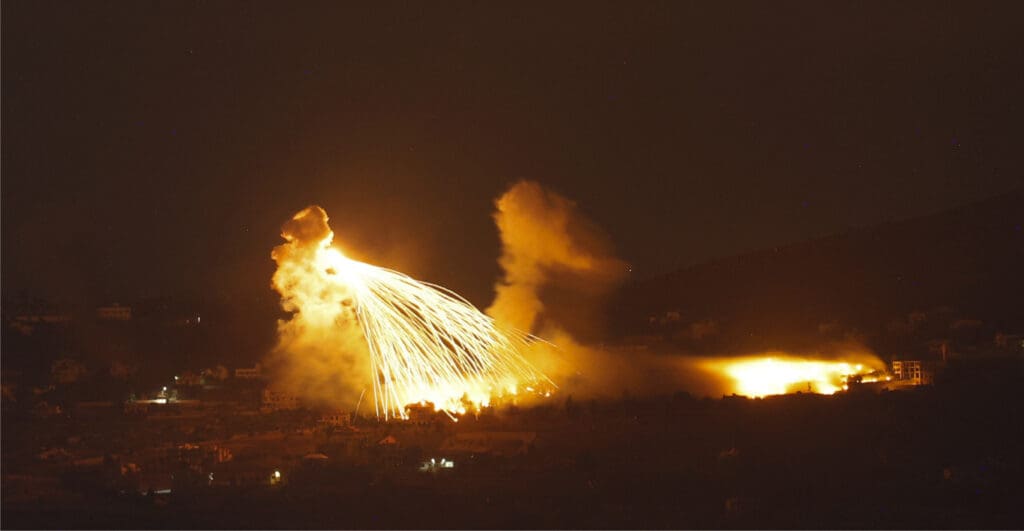In the aftermath of Israel’s successful assassination of Hezbollah Secretary-General Sayyed Hassan Nasrallah, and as Israel begins its ground incursion in parts of southern Lebanon, two interrelated issues emerge.
First, the status of Hezbollah and its future role in Lebanon and the region come into question. While Nasrallah’s assassination dealt a significant blow to the party—especially as it coincided with a series of assassinations targeting high-ranking security and military officials, and severe attacks on its popular base in the southern suburbs, southern Lebanon and Beqaa in the east—it is far from crippling. The party’s central political structure remains intact, sustained by a robust network of veteran and younger leaders, and supported by well-established social, cultural and political institutions within the Shiite community. This structure, led by experienced current and former members of parliament, ministers, religious leaders and heads of various agencies, ensures Hezbollah’s continued resilience and influence.
Moreover, support for Hezbollah within Lebanon’s Shiite community is unlikely to wane; instead, it may become more radicalized, as the population perceives these events as a threat to the sect’s political presence in the country. However, broader national support, driven by a sense of injustice and the party’s role in resisting external aggression, may fluctuate depending on Hezbollah’s policies and its relationships with other segments of Lebanese society, as seen in previous periods.
Internally, the party will undoubtedly need to accelerate the leadership transition, with the role of secretary-general likely to pass to the pre-designated successor, Sayyed Hashem Safieddine, Nasrallah’s cousin. It will also have to fill the military and security positions left vacant by Israeli strikes. This process will be aided by the availability of experienced personnel and ongoing, direct supervision from Iran.
The party will undoubtedly face a series of challenges, the foremost being an assessment of why it failed to anticipate and prevent the losses it has sustained. Its strategy of supporting Gaza was based on a judgement that adhering to the established rules of engagement and mutual deterrence would suffice. However, it soon became clear that this assessment was flawed, allowing Israel to prepare for an escalation on the northern front. While Hezbollah forces succeeded in displacing several settlements in Galilee and causing casualties among Israeli soldiers and positions during the war on Gaza, the Israeli army ultimately has had the upper hand. This was evident in the extensive human and material losses inflicted on southern Lebanese villages, Beqaa and Beirut suburbs. It is also true of Israel’s successful assassination of over 400 members of Hezbollah, Hamas and Islamic Jihad, including many senior figures, before the most recent and intense strikes.
Moreover, the most significant mistake everyone made was ignoring the level of Zionist brutality, as the military has committed unprecedented acts of violence in contemporary warfare. The resistance front also overlooked the implications of the United States’ involvement in efforts to eliminate radical forces such as Hamas, Islamic Jihad and Hezbollah from the Middle East. Additionally, they ignored repeated American and European warnings about the risks of an “open” war, while Iran’s support was constrained by the necessity for restraint. Conversely, there has been a widespread miscalculation regarding Netanyahu’s strategy of prolonging the war on Gaza, which has diminished the capabilities and objectives of the regional support front over time. It is likely groups like Hezbollah never anticipated that they would need to maintain an open exchange of hostilities with Israel for an entire year. The Israeli army and extremist settlers have also ramped up their attacks in the West Bank, diminishing the capacity of resistance networks there and displacing entire communities.
In Lebanon, the Israeli escalation occurred just before Netanyahu’s arrival at the United Nations, where consultations were underway among the United States, France, Egypt, Saudi Arabia, Qatar (the Quintet), and even Iran regarding a new Gaza agreement, which the Americans quickly announced. However, Netanyahu prepared for his UN General Assembly appearance with a series of strikes: on pagers on September 17, on radios on September 18, the assassination of military leaders on September 20, and the Black Monday strike in the suburbs on September 23. This culminated in the severe airstrikes aimed at assassinating Sayyed Nasrallah on September 27, involving 85 missiles, each carrying about a ton of explosives. Netanyahu aimed to create a fait accompli to bolster his position in New York and the Gaza negotiations, leveraging a clear U.S. (and European) stance that expressed relief at eliminating the “terrorists” sought by the U.S. and the international community.
Domestic Dynamics in Lebanon
Second, the declared war on Hezbollah and Lebanon has coincided with deepening societal divisions regarding involvement in the conflict to support Gaza. Many Lebanese are strongly opposed to dragging Lebanon into another war. This renewed division occurred alongside ongoing disputes over the presidential elections, which the events in Gaza have disrupted, hindering the Quintet committee’s and other international efforts to agree on a consensus candidate. However, as the brutal offensive escalated, a state of shock was followed by significant solidarity, particularly through the positions of Walid Jumblatt, Lebanon’s leading Druze politician, as well as a collective effort to shelter and aid refugees. This led other top Lebanese political figures like Samir Geagea, Sami Gemayel, Saad Hariri, Najib Mikati and others to declare that now is the time for unity rather than disagreement. Many are hopeful that a meeting between Jumblatt, Mikati and Nabih Berri, the speaker of parliament, will yield a rescue plan that can gain consensus among the parties to protect Lebanon from a bleak future that Netanyahu appears to envision.
The mass displacement triggered by the escalation is particularly devastating, with some describing it as a disaster. This situation has not only failed to diminish the wave of solidarity and unity but has also revealed the stark realities of “a plundered nation, a fractured society, and a bankrupt, dilapidated state,” as Dr. Ahmad Baydoun noted. The gravity of this disaster is intensified by the lack of international or Arab support and assistance, along with the absence of civil society organizations and official institutions, unlike during the July 2006 war. The pressing questions on the minds of Lebanese today center on how far the Israeli ground offensive, which began at dawn on October 1 in the south, will expand and what its prospects are. This is especially concerning given that the U.S. ostensibly opposes the expansion of the war in Lebanon, while nevertheless approving strikes against Hezbollah and pursuing its dismantling. Meanwhile, concerns also focus on Hezbollah’s preparedness to repel the invasion after enduring numerous strikes and setbacks.
It is clear that Israel will go to great lengths to settle its score with Lebanon and Hezbollah as long as the opportunity arises, and the international community remains indifferent. Israel’s current, limited ground incursion could potentially lead to an invasion of southern Lebanon and Beqaa to establish a buffer zone, similar to its actions in Gaza. Consequently, it is likely that Israel will extend its ground operation to reach the Litani River and possibly beyond, aiming to enforce a settlement on Lebanon and Hezbollah through the complete implementation of UN Security Council Resolution 1701. Israel may continue its attacks, including ground operations, to dismantle Hezbollah’s military infrastructure and weapon depots, seeking to weaken or eliminate the group, especially given its recent successes in assassinating political and military leaders.
An alternative scenario involves direct intervention from Iran. Thus, the future of Lebanon hinges on the resistance’s ability to endure these strikes, Iran’s position in the impending confrontation and the willingness of Hezbollah and local leaders—particularly Nabih Berri and Walid Jumblatt—to implement Resolution 1701. Notably, Hezbollah maintains its stance against any southern Lebanon agreement not linked to a ceasefire in Gaza, a position echoed by Walid Jumblatt, who has called for revisiting the 1949 armistice agreement.
Meanwhile, it appears that Nabih Berri and Najib Mikati have reached an understanding to fast-track the election of a consensus president, with commander-in-chief of the Lebanese army Joseph Aoun being a likely candidate to lead negotiations on implementing Resolution 1701.


